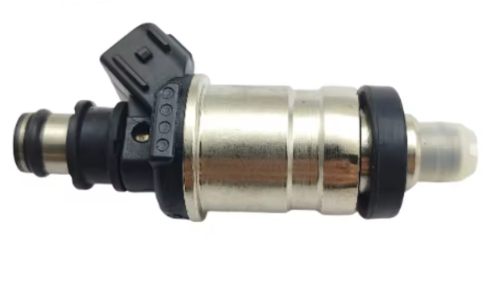The Role of Fuel Injectors in Optimizing Fuel Efficiency
Fuel Injector Function and Its Impact on Fuel Efficiency
Fuel injectors today work like really accurate valves that spray tiny bits of fuel straight into engine combustion areas or the air intake system. They're way better than old school carburetors because they measure fuel so precisely which matters a lot when it comes to getting good combustion efficiency. When these injectors are working right, cars can actually save around 15% on gas compared to ones that have started to wear out according to studies from SAE last year. The reason? These injectors break fuel down into super small droplets, which means there's more surface area available for burning. That leads to cleaner combustion and less leftover fuel going out the exhaust pipe.
The Connection Between Fuel Injectors and Air-Fuel Ratio Balance
The fuel injectors in modern vehicles are responsible for keeping that sweet spot of around 14.7 parts air to 1 part fuel, what engineers call stoichiometric combustion. When these injectors get clogged or start acting up, they throw off this delicate balance. Engines will either end up running too rich with extra fuel or too lean where there isn't enough going in. According to some studies from the EPA back in 2022, if the fuel spray doesn't hit its mark properly, we're looking at roughly 12% more gas being burned than necessary. Beyond just burning through fuel faster, this kind of imbalance creates more pollution as well. So really, fuel injectors aren't just another part under the hood they're basically controlling whether our cars run clean and efficient or become little gas guzzlers spewing out unwanted emissions.
Precision and Timing of Fuel Injection for Optimal Combustion
The latest fuel injectors can tweak how much fuel gets delivered as often as once per millisecond, matching up perfectly with when the pistons move for best possible burning inside the engine. These days, most modern setups change when they spray fuel depending on what the engine is doing right then. They send more fuel into the mix when someone steps on the gas pedal, but cut back significantly when the car just sits there idling. According to research published by the Auto Research Institute in 2024, getting this timing spot on cuts down harmful exhaust gases by around twenty percent and makes cars run about eight percent better on gas. Getting those fractions of a second right means engines pull out all the power possible from each little bit of gasoline burned.
Clean Fuel Injectors and Their Impact on Combustion Efficiency
How Clean Fuel Injectors Improve Fuel Economy
Keeping fuel injectors clean makes sure the engine gets just the right amount of fuel, which helps it run efficiently. When injectors get clogged or dirty, they start spraying fuel all wrong, causing some parts of the engine to get too much while others get too little. The result? Fuel doesn't burn properly. According to various industry reports, engines with good injector maintenance tend to save around 15% on fuel consumption because they maintain that sweet spot of about 14.7 parts air to 1 part fuel. Cleaner injectors mean less gas goes to waste, fewer harmful emissions come out the tailpipe, and drivers end up spending less money at the pump over time.
Fuel Atomization and Its Role in Efficient Combustion
Getting good combustion really hinges on how well fuel gets broken down into tiny droplets through what's called atomization. When injectors are clean, they spray fuel evenly so it burns thoroughly. But when there's buildup inside those injectors, the fuel ends up as bigger droplets that don't burn right across the engine chamber. Looking at test results from SAE studies last year, engines with better atomization saw their thermal efficiency jump anywhere between 8 to 12 percent, which means actual money saved at the pump over time. Keeping injectors clean stops carbon gunk from messing with this whole process, something mechanics know is vital for maintaining both performance and economy in modern engines.
Case Study: Measured Fuel Efficiency Gains After Injector Cleaning
A 2023 fleet study analyzed 50 vehicles with fuel consumption spikes averaging 18% above baseline. After professional injector cleaning:
- 92% showed immediate MPG improvements (average gain: 12.4%)
- Hard acceleration events dropped by 31%, indicating smoother combustion
- Post-treatment emissions fell by 22%, highlighting restored combustion efficiency
These results demonstrate how proactive maintenance prevents escalating fuel costs and performance decline.
Common Symptoms of Clogged or Faulty Fuel Injectors
Faulty fuel injectors manifest through distinct performance issues. Drivers often experience rough idling (engine vibrations at stops) and hesitation during acceleration due to inconsistent fuel delivery. A 15–30% drop in fuel economy frequently accompanies these symptoms. Other warning signs include:
- Persistent check engine lights triggered by combustion irregularities
- Black exhaust smoke from unburned fuel
- Engine misfires during cold starts
How Clogged Fuel Injectors Increase Fuel Consumption
Clogged injectors disrupt the air-fuel ratio, prompting the Electronic Control Unit (ECU) to compensate by extending injector pulse width. This delivers excess fuel to counteract poor atomization, increasing consumption by 10–25%. A partially blocked injector may spray fuel in a dense stream rather than a fine mist, resulting in:
- Incomplete combustion cycles
- Repeated fuel-rich conditions in cylinders
- Wasted fuel expelled through the exhaust
Impact of Poor Injector Performance on Combustion Efficiency
Compromised injectors reduce combustion efficiency by 18–35%, according to engine performance benchmarks. Uneven distribution between cylinders creates localized rich or lean zones, leaving up to 12% of fuel unburned. This inefficiency leads to:
- Increased hydrocarbon and carbon monoxide emissions
- Accelerated spark plug fouling from carbon buildup
- Engine knocking due to delayed combustion timing
Deposit Buildup and Long-Term Effects on Fuel Injector Performance
How Deposit Formation Reduces Fuel Injector Efficiency
When deposits build up inside diesel injectors, they mess with the fine spray patterns needed for proper engine performance. These External Diesel Injector Deposits, or EDIDs as they're called technically, tend to collect right at the nozzle tips where heat builds up and fuel starts breaking down over time. In really bad situations, these deposits can actually reduce the space through which fuel flows by almost 37%, which is no small number when talking about engine efficiency. The result? Fuel gets distributed unevenly across cylinders, leading to anywhere from a 6% to 12% loss in overall fuel economy. And it's not just what happens outside the injector either. Inside the device itself, deposits accumulating on those tiny needle components throw off how accurately fuel gets measured out. This means engines have to burn extra fuel just to keep producing the same amount of power, something mechanics see all the time during routine tune-ups.
Long-Term Consequences of Unclean Injectors on Engine Performance
When grime builds up over time, it really takes a toll on parts such as piston rings and catalytic converters. According to research published in Fleet Equipment Magazine last year, cars whose fuel injectors weren't properly maintained needed about 23 percent more regular servicing throughout their first hundred thousand miles. The problem gets worse for the environment too. Vehicles with these deposits tend to emit around 18% more nitrogen oxides and nearly 30% extra particulate matter from their exhaust systems. And let's not forget what happens long term. Engines running inefficiently because of this buildup often don't last as long as they should, sometimes cutting down the life expectancy of gas engines by anywhere between thirty to fifty thousand miles depending on usage conditions.
Maintenance Strategies for Sustained Fuel Savings with Fuel Injectors
Fuel Injector Cleaning and Restoration of Engine Performance
Regular cleaning prevents deposit buildup, ensuring accurate fuel delivery. Clogged injectors can reduce fuel economy by up to 12% in gasoline engines (EPA 2024) due to erratic spray patterns and incomplete combustion. Professional cleaning restores flow rates by up to 98%, eliminating acceleration hesitation and stabilizing idle RPMs.
Cost Savings Over Time Through Regular Fuel Injector Maintenance
A $50–$150 injector cleaning every 30,000 miles saves $200–$500 annually in fuel costs for the average driver. Neglected injectors force engines to consume 15% more fuel to compensate for inefficient combustion–costing over $900 in wasted fuel over five years.
Recommended Maintenance Intervals for Optimal Fuel Injector Function
| Maintenance Task | Frequency | Key Benefit |
|---|---|---|
| Fuel system cleaning | 30,000 miles | Prevents nozzle clogging |
| Fuel filter replacement | 15,000–30,000 miles | Blocks particulate contamination |
| Professional flow-rate testing | 60,000 miles | Identifies early wear patterns |
Industry Insight: Delayed Maintenance vs. Rising Fuel Costs
Fleet operators who postponed injector servicing during 2020–2023 reported 23% higher fuel expenditures than those adhering to schedules–a gap widened by record fuel prices. Proactive maintenance offsets 80% of efficiency losses linked to aging injection systems.
Evolution of Fuel Injection Systems: Direct vs. Port, Smart Injectors, and Efficiency Trends
Direct injection systems today offer around 15 percent improvement in fuel efficiency compared to older port injection methods. However, they need cleaning about 40% more often because they run at much higher pressure levels. The latest smart injectors equipped with piezoelectric actuators can tweak fuel delivery every 0.1 milliseconds, which cuts down fuel use during those frustrating stop and go traffic situations by nearly 18%, according to research from SAE in 2023. What this means for drivers is that manufacturers are increasingly focused on getting those tiny adjustments right if they want to squeeze maximum mileage out of each tankful.
FAQ
What role do fuel injectors play in fuel efficiency?
Fuel injectors are crucial for achieving precise fuel measurement, breaking down fuel into tiny droplets for optimal combustion, and maintaining the air-fuel ratio balance, all of which improve fuel efficiency.
How can keeping fuel injectors clean benefit my car?
Clean fuel injectors ensure the engine receives the right amount of fuel, improving combustion efficiency which reduces fuel waste and emissions.
How often should I clean my fuel injectors?
It's recommended to clean your fuel injectors every 30,000 miles to maintain optimal engine performance and fuel efficiency.
What are the signs of failing fuel injectors?
Signs include rough idling, hesitation during acceleration, decreased fuel economy, persistent check engine lights, and black exhaust smoke.
How do dirty fuel injectors affect engine performance?
Dirty fuel injectors can lead to incomplete combustion, increased emissions, engine knocking, and accelerated wear on engine parts, resulting in decreased performance.
Table of Contents
- The Role of Fuel Injectors in Optimizing Fuel Efficiency
- Clean Fuel Injectors and Their Impact on Combustion Efficiency
- Common Symptoms of Clogged or Faulty Fuel Injectors
- How Clogged Fuel Injectors Increase Fuel Consumption
- Impact of Poor Injector Performance on Combustion Efficiency
- Deposit Buildup and Long-Term Effects on Fuel Injector Performance
-
Maintenance Strategies for Sustained Fuel Savings with Fuel Injectors
- Fuel Injector Cleaning and Restoration of Engine Performance
- Cost Savings Over Time Through Regular Fuel Injector Maintenance
- Recommended Maintenance Intervals for Optimal Fuel Injector Function
- Industry Insight: Delayed Maintenance vs. Rising Fuel Costs
- Evolution of Fuel Injection Systems: Direct vs. Port, Smart Injectors, and Efficiency Trends
- FAQ

